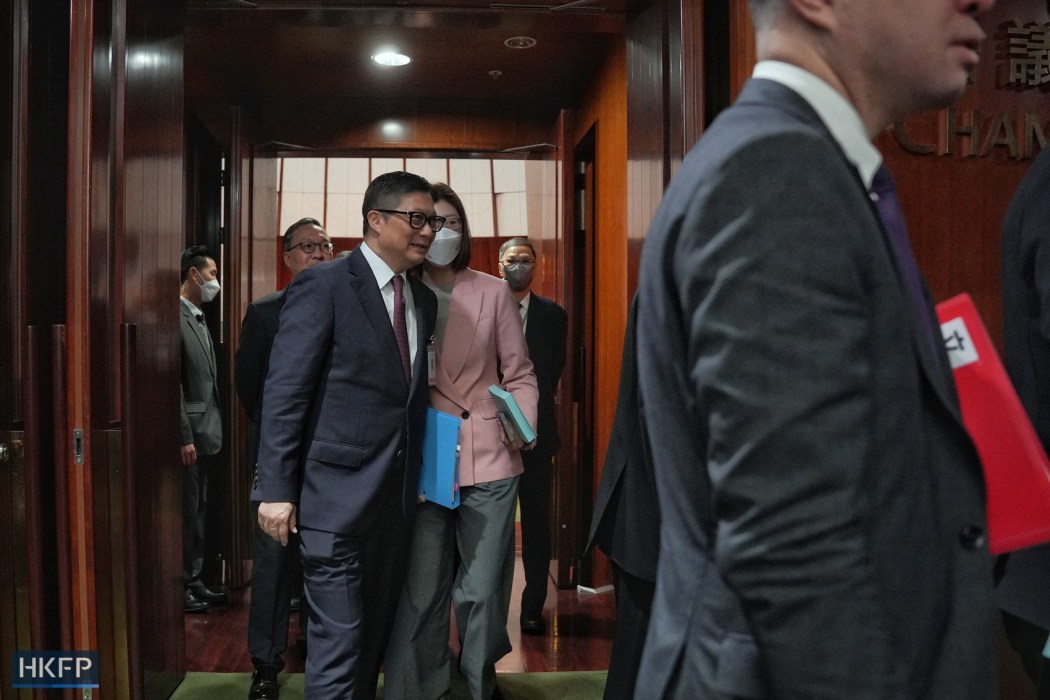Hongkongers could face up to seven years behind bars for “inciting disaffection of public officers,” if a draft of Article 23, the homegrown security law, is passed.

Under the Safeguarding National Security Bill, set to be scrutinised at the opposition-free legislature from Friday, a person would be held liable if they invite a public officer “to abandon upholding the Basic Law and abandon the allegiance to the HKSAR.” If collusion with an external party is involved, they could face 10 years in prison.
The draft legislation states that a public officer includes permanent or temporary officials, and those who work for quasi, or statutory, bodies like the Equal Opportunities Commission, as well as the judiciary. Executive Council, District Council, Election Committee and legislative members are also included, as well as mainland officials stationed in Hong Kong.
Article 23 of the Basic Law stipulates that the government shall enact laws on its own to prohibit acts of treason, secession, sedition and subversion against Beijing. Its legislation failed in 2003 following mass protests and it remained taboo until after the onset of the separate, Beijing-imposed security law in 2020. Pro-democracy advocates fear it could have a negative effect on civil liberties but the authorities say there is a constitutional duty to ratify it.
Swift passage expected
The Legislative Council will convene a special meeting at 11 am on Friday for the first reading of the the bill according to its schedule. It comes just nine days after the end of a public consultation which prompted more than 13,000 submissions. Around 97 per cent of of the submissions received had expressed their support for the law, according to the government.
See also: Article 23 then and now: What changed between 2002 and 2024
Chief Executive John Lee said in a statement on Thursday that he had notified LegCo President Andrew Leung that “both the government and the Legislative Council have the responsibility to, and must, make every endeavour to complete the enactment of the legislation at the earliest possible time.”
According to local media reports, authorities hope to have the bill passed by National Security Education Day on April 15.
Article 23 security law bill in full:
- Hong Kong proposes dissolving organisations accused of ‘external interference’
- Threshold for early release may be raised for national security prisoners, draft bill says
- Hong Kong proposes life sentences for treason, insurrection, sabotage
- New powers mulled for police, courts to limit nat. security detainees’ access to lawyers
- Hong Kong proposes cancelling ‘absconders’ passports under new security law
- Public interest defence proposed for some ‘state secrets’ offences in draft security law
- Hong Kong proposes raising max. penalty for sedition to 10 years under new sec. law
- Courts could extend detention without charge for 2 weeks, draft nat. sec. bill suggests
- Hongkongers may face 7 years jail for ‘inciting disaffection’ of public officers
- Hong Kong’s business community expresses concern over proposed new security law
Support HKFP | Policies & Ethics | Error/typo? | Contact Us | Newsletter | Transparency & Annual Report | Apps
Help safeguard press freedom & keep HKFP free for all readers by supporting our team

LATEST FROM HKFP
HKFP has an impartial stance, transparent funding, and balanced coverage guided by an Ethics Code and Corrections Policy.
Support press freedom & help us surpass 1,000 monthly Patrons: 100% independent, governed by an ethics code & not-for-profit.











